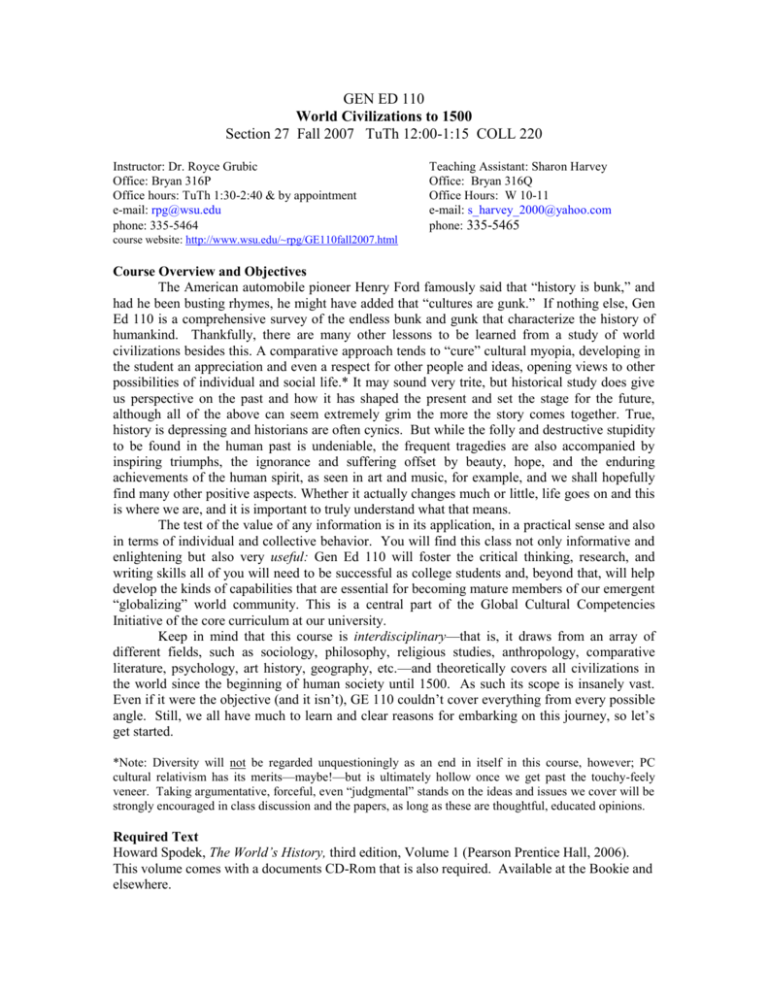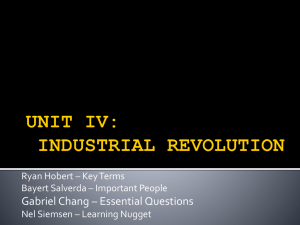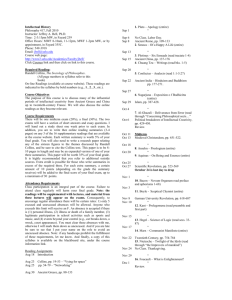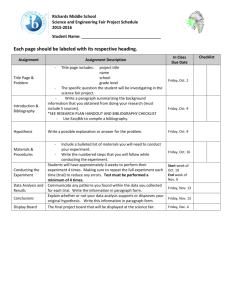
GEN ED 110
World Civilizations to 1500
Section 27 Fall 2007 TuTh 12:00-1:15 COLL 220
Instructor: Dr. Royce Grubic
Office: Bryan 316P
Office hours: TuTh 1:30-2:40 & by appointment
e-mail: rpg@wsu.edu
phone: 335-5464
Teaching Assistant: Sharon Harvey
Office: Bryan 316Q
Office Hours: W 10-11
e-mail: s_harvey_2000@yahoo.com
phone: 335-5465
course website: http://www.wsu.edu/~rpg/GE110fall2007.html
Course Overview and Objectives
The American automobile pioneer Henry Ford famously said that “history is bunk,” and
had he been busting rhymes, he might have added that “cultures are gunk.” If nothing else, Gen
Ed 110 is a comprehensive survey of the endless bunk and gunk that characterize the history of
humankind. Thankfully, there are many other lessons to be learned from a study of world
civilizations besides this. A comparative approach tends to “cure” cultural myopia, developing in
the student an appreciation and even a respect for other people and ideas, opening views to other
possibilities of individual and social life.* It may sound very trite, but historical study does give
us perspective on the past and how it has shaped the present and set the stage for the future,
although all of the above can seem extremely grim the more the story comes together. True,
history is depressing and historians are often cynics. But while the folly and destructive stupidity
to be found in the human past is undeniable, the frequent tragedies are also accompanied by
inspiring triumphs, the ignorance and suffering offset by beauty, hope, and the enduring
achievements of the human spirit, as seen in art and music, for example, and we shall hopefully
find many other positive aspects. Whether it actually changes much or little, life goes on and this
is where we are, and it is important to truly understand what that means.
The test of the value of any information is in its application, in a practical sense and also
in terms of individual and collective behavior. You will find this class not only informative and
enlightening but also very useful: Gen Ed 110 will foster the critical thinking, research, and
writing skills all of you will need to be successful as college students and, beyond that, will help
develop the kinds of capabilities that are essential for becoming mature members of our emergent
“globalizing” world community. This is a central part of the Global Cultural Competencies
Initiative of the core curriculum at our university.
Keep in mind that this course is interdisciplinary—that is, it draws from an array of
different fields, such as sociology, philosophy, religious studies, anthropology, comparative
literature, psychology, art history, geography, etc.—and theoretically covers all civilizations in
the world since the beginning of human society until 1500. As such its scope is insanely vast.
Even if it were the objective (and it isn’t), GE 110 couldn’t cover everything from every possible
angle. Still, we all have much to learn and clear reasons for embarking on this journey, so let’s
get started.
*Note: Diversity will not be regarded unquestioningly as an end in itself in this course, however; PC
cultural relativism has its merits—maybe!—but is ultimately hollow once we get past the touchy-feely
veneer. Taking argumentative, forceful, even “judgmental” stands on the ideas and issues we cover will be
strongly encouraged in class discussion and the papers, as long as these are thoughtful, educated opinions.
Required Text
Howard Spodek, The World’s History, third edition, Volume 1 (Pearson Prentice Hall, 2006).
This volume comes with a documents CD-Rom that is also required. Available at the Bookie and
elsewhere.
In addition, there will be occasional required readings distributed in class or posted on-line.
There will be occasional references to the Summer Common Reading, Gina Kolata’s Flu (New
York: Touchstone, 2005), both in class and in the paper assignments.
•Please bring the Spodek text to each class meeting, as we will often be referring to the maps,
illustrations, etc.
Course Requirements
•EXAMS: There will be 2 in-class exams based on the lecture material and readings. Each exam
will take the full class period and will consist primarily of IDs and matching. There is no final
exam scheduled.
•PAPERS: 3 papers will be required, each generally 4-11 pages in length. These must be typed
and double-spaced and have correct academic format, preferably Chicago-style or MLA. The
assignment prompts will be distributed in class several days prior to the due date (see the attached
Class Schedule). The third paper is designed as a term paper, and will call upon the students to
drawn upon and synthesize material and themes from the entire course. Each paper assignment in
some way will focus on information literacy—the ability to effectively navigate and evaluate
source material and to recognize the standards involved in being a responsible member of the
academic discourse community.
• HOMEWORK: There are also several shorter assignments which will count as homework, as
well as semi-regular QUIZZES which may or may not be announced ahead of time.
•PARTICIPATION will be an important component of your course grade, both in terms of
quantity and quality, as the course will follow an “active and inquiry-based learning” model
rather than the traditional lecture style. Note that office hour visits and substantive e-mail
correspondence also count toward your overall participation. ATTENDANCE will not
necessarily be taken daily, but I do keep mental notes on this and it will also factor into your
participation grade. Furthermore, it is very doubtful that any student who misses an unusually
high number of classes will be able to do well on the exams or papers, and I regard poor
attendance as a personal insult. Attendance may also be compulsory at outside of class cultural
events such as film showings, dates and times TBA.
*POLICY ON LATE ASSIGNMENTS: Late assignments will automatically receive a lower
score than any of those turned in on time, unless an extension has been requested and explicitly
granted at least 24 hours before the due date. Deadlines are an important part of “real” life, and
need to be taken seriously.
Grade Distribution
Exam 1
Exam 2
Paper 1
Paper 2
Paper 3
Homework/Quizzes
Participation
15%
20%
10%
15%
25%
10%
5%
*A NOTE ON CLASSROOM BEHAVIOR—While I try to foster a free-spirited and open
classroom atmosphere, in your participation you should be aware of the others in the room and
show consideration and respect for their presence. This includes refraining from interrupting
other students and from making thoughtless comments that might be construed as personally
offensive. Otherwise, let it fly. If it is done with any substance, the search for knowledge cannot
help but to be jarringly critical and uncomfortable at times—yet it need never be disrespectful.
BEWARE: Eating in class is a distraction that will not be permitted—unless, of course, you
bring enough food for everybody. We are all aware of what time of day the course meets. Have
your lunch before or after class, not during. Keep your cell phones turned off and tucked away.
*ACADEMIC HONESTY—All students are expected to do their own work without seeking an
unfair advantage over other students. Dishonest acts like plagiarism (passing off someone else's
work as your own), copying, having someone else write your papers or exams, or using prewritten notes on an in-class examination will result in expulsion from the course and/or a grade of
"F." Instances of cheating will also be reported to appropriate university officials.
*STUDENTS WITH DISABILITIES—Reasonable accommodations are available for students
who have a documented disability. Please notify the instructor during the first week of class of
any accommodations needed for the course. Late notification may cause the requested
accommodations to be unavailable. All accommodations MUST be approved through the
DRC (Admin Annex Bldg, Rooms 205). Call (509) 335-3417 to make an appointment with a
disability counselor.
Tentative Class Schedule
WHDCDR=World History Documents CD-Rom
Tu Aug 21
Course Introduction; What is History?
Th Aug 23
What is History? (cont.)
**personal history homework assignment due**
Reading Due: Spodek, Introduction (“The World Through Historians’ Eyes”)
Tu Aug 28
Human Origins and “Pre-History”; Cosmogony
Reading Due: Spodek, 2-20; WHDCDR, 78-79
Th Aug 30
Early Evolutionary, Technological, and Cultural Breakthroughs
**“true” myth/“false“ myth homework assignment due**
Reading Due: Spodek, 20-38
Tu Sep 4
Mesopotamia; Rise of Agriculture; First Cities; Law
Reading Due: Spodek 40-62, 127-130; WHDCDR, 1-22, 44
Th Sep 6
Egypt; Slavery; Ideas of the Afterlife; Polytheism vs. Monotheism
Reading Due: Spodek, 65-78, 131-139; WHDCDR 23-33
Recommended: watch the overview of Ancient Egypt at
http://www.artic.edu/cleo/index.html
Tu Sep 11
Indus Valley Civilization; Caste and Class; Reading Artifacts; Why do
civilizations disappear?
Reading Due: Spodek, 79-86; WHDCDR 78-79
Th Sep 13
Early China; “The Mandate of Heaven”; Warring States Period; Taoism and
Confucianism
Reading Due: Spodek 89-97, 208-214; WHDCDR 45-71
Tu Sep 18
**PAPER 1 DUE**
Early China (cont.)
Reading Due: Spodek 97-114, 394-400;
Th Sep 20
Early China (cont.); the Americas and Africa; Exam Q&A
Reading Due: Spodek 394-400
Jared Diamond, “The Ancient
Ones: The Anasazi and their Neighbors,” from
http://www.wsu.edu/~rpg/diamond.pdf
Recommended: visit http://www.ancientmexico.com/
Tu Sep 25
Empires; Homeric Greece; the Polis
Reading Due: Spodek, 118-127, 139-143; WHDCDR 118-119
Recommended: watch the overview of Ancient Greece at
http://www.artic.edu/cleo/index.html
Th Sep 27
**EXAM 1**—bring a blue book and a black pen!
Tu Oct 2
Athens; the Peloponnesian War
Reading Due: Spodek 143-154, WHDCDR 120-133, 139; Kolata, 35-37
Th Oct 4
Alexander the Great; Early Rome, the Republic, and Caesar
Reading Due: Spodek, 154-159, 163-179; WHDCDR 134-137, 140-145
Tu Oct 9
The Rise and Fall of the Roman Empire
Reading Due: Spodek, 180-201, WHDCDR 146-152
Th Oct 11
Greece and Rome: Leftovers and Legacy
Tu Oct 16
**PAPER 2 DUE**
Unification of China; Early Japan
Reading Due: Spodek, 205-207, 214-237; WHDCDR 72-77, 220-230
Th Oct 18
The Axial Age; Introduction to World Religions
Reading Due: Spodek, 265-272, 385-387
Tu Oct 23
Hinduism and Jainism
**Hinduism homework assignment due**
Reading Due: Spodek 241-261, 273-285; WHDCDR 80-97, 108-109
Th Oct 25
Buddhism
Reading Due: Spodek, 285-303; WHDCDR 98-107, 110-116, 231
Tu Oct 30
Judaism; Command Ethics; Diaspora
Reading Due: 307-320; WHDCDR 42-44
Th Nov 2
Early Christianity
Reading Due: Spodek, 321-341, WHDCDR 153-163, 165-171
Tu Nov 6
Islam
Reading Due: Spodek 345-376, 401-402; WHDCDR 192-219, 258-259
Th Nov 8
Islam (cont.)
Recommended: take the virtual tour of the Alhambra,
http://www.saudiaramcoworld.com/issue/200604/#
Tu Nov 13
**EXAM 2**—bring a blue book and black pen
Th Nov 15
Early Trade Routes; the Mongol Empire
Reading Due: Spodek, 388-394, 402-421; WHDCDR 256-257, 260-265, 276278
Tu Nov 20Th Nov 22
NO CLASS—Thanksgiving Recess
Tu Nov 27
Vikings; Medieval Europe, HRE, Feudalism, Aquinas, Crusades, the Reconquista
Reading Due: Spodek, 425-426, 335-336, 376-380, 430-437; WHDCDR
164, 174-191, 235-240, 243-251; Kolata, 38-41
Th Nov 29
Medieval Europe (cont.)
**Medieval Europe homework assignment due**
Tu Dec 4
the Renaissance and the New World
Reading Due: Spodek, 438-447; WHDCDR 298-300
Th Dec 6
Concluding Lecture; Instructor Evaluations
Wed Dec 12
**PAPER 3 DUE**—turn in to Bryan 316 by 2 pm








